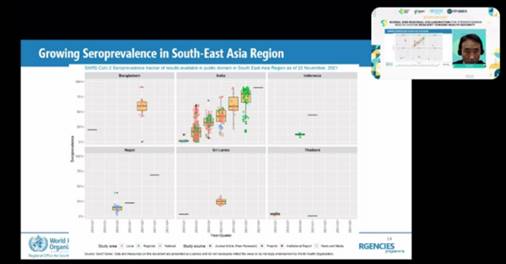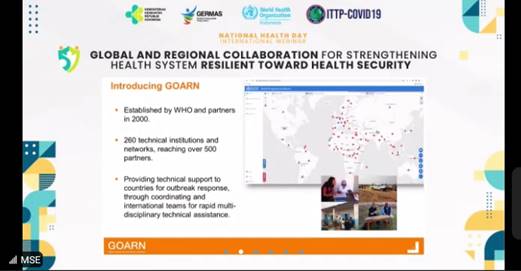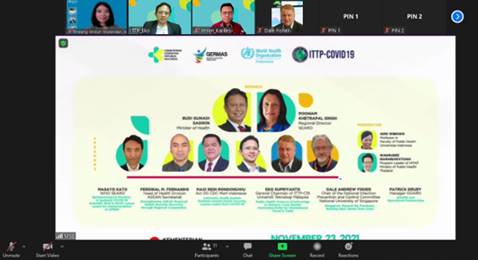On 23 November, as part of the national health day webinar series, the Ministry of Health (MoH), in collaboration with WHO, organized an international webinar on ‘Strengthening Health Systems Resilience Towards Health Security’. A total of 580 participants from multiple sectors attended the webinar. Participants included healthcare workers, representatives from Provincial (PHOs) and District Health Offices (DHOs), health facilities, universities, public health scholars, and professional organizations. The webinar aimed to improve knowledge and increase awareness, to learn from COVID-19 experiences to strengthen health systems to advance health security and improve global and regional collaboration for strengthened health security.

Dr Masaya Kato, WHO South East Asia Region, presented ‘COVID 19: Epidemiological and Scientific Updates and Lessons Learnt from the Pandemic Response’ during the webinar, 23 November 2021 (Credit: Endang Wulandari/WHO)
The Minister of Health opened the webinar and emphasized lessons learned from COVID-19 to strengthen health system resilience, ensure emergency funding is accessible to all countries and technical and logistics support can be mobilized when a pandemic emerges. Global health protocols, guidelines, and interoperable information systems should be strengthened to respond quickly and effectively. There is also a need to advocate more for technology transfers for essential countermeasures. Each country should have equal access to vaccines, therapeutics, and diagnostics. The global health system architecture should adhere to solidarity, accountability, and equity.

Patrick Drury, WHO Manager of the Global Outbreak Alert and Response Network (GOARN) delivered a presentation on GOARN and operational partnerships during the webinar (Credit: Endang Wulandari/WHO)
During her remarks, Dr Poonam Khetrapal Singh, WHO Regional Director for South East Asia, commended the Government of Indonesia for their robust response to the COVID 19 pandemic and reiterated the importance of: (1) acceleration of vaccination among high risk groups, including the older population and people with underlying medical conditions; (2) continuous implementation of evidence informed public health and social measures to control transmission; (3) contact tracing, quarantine and isolation to ensure rapid response to localized clusters, which is critical in preventing larger community transmission; (4) strengthen genomic surveillance activities for monitoring of SARS CoV 2 variants; (5) strengthen health emergency preparedness and health system readiness; and (6) periodic monitoring of the implementation of Intra Action Review (IAR) recommendations. She also commended Indonesia’s active participation and leadership in health and health security in the South East Asia region.

Speakers flyer: international webinar on ‘Strengthening Health Systems Resilience Towards Health Security’, organized by the Ministry of Health and WHO on 23 November 2021 (Credit: Endang Wulandari/WHO).
The pressure on the health care system and mortality are both higher in countries with lower vaccine uptake. Key messages included:
- Population immunity is growing and scientific knowledge progressing, however, there remain uncertainties.
- Continue to enhance population immunity through vaccination, ensuring high uptake among old adults and other priority populations.
- Manage local outbreaks effectively to prevent further transmission, fostering community engagement and a risk-based application of PHSM.
- Ensure an early warning system for timely decision-making and response.
As part of the national health day webinar series, the webinar serves as a momentum to raise awareness of health personnel and multi sectors at all levels to strengthen health system resilience towards health security as part of regional and global communities. The issues discussed during the webinar also contributed to the development of issues for the G20 summit with the prospective theme ‘Recover Together, Recover Stronger’ for Indonesia’s G20 presidency.
***
